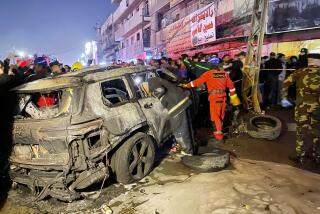Thousands of Iraqi Shiites join military to turn back ISIS militants

Los Angeles Times columnist Doyle McManus talks with video journalist Ann Simmons about the crisis in Iraq as militants threaten to take control, and the United States weighs its options.
Thousands of young Iraqi Shiite Muslims volunteered for military service Saturday and an American aircraft carrier headed toward the Persian Gulf in efforts to counter the blitz attack by Sunni militants sweeping through Iraq’s northern provinces.
The Islamic State of Iraq and Syria, an Al Qaeda splinter group notorious for its harsh application of Islamic sharia law, continued its advance, seizing the small town of Adeim in Diyala province after Iraqi security forces pulled out, according to a local official cited by the Associated Press.
In recent days, ISIS has captured Mosul, one of the nation’s largest cities, and other communities in the vicinity of the Syrian border. In several cases, Iraqi army and police units shed their uniforms and abandoned their equipment.
Seeking to stem the tide, Iraq’s prime minister on Saturday threatened troops with execution for abandoning their posts. In a televised address from Samarra to a group of army officers, Prime Minister Nouri Maliki promised punishment for any soldiers who had contributed Tuesday to the swift fall of Mosul and other cities.
“Those who did nothing, and those who clearly abandoned their posts, let them not imagine that they escaped to [safety] in the houses of their families and mothers,” Maliki said, adding that those found to have deserted would be prosecuted “to the utmost, with punishments that rise to execution.”
“Frankly, this was our chance to get rid of those cowards and weaklings,” he said. “This is our opportunity to improve the army and purify it from these elements.”
Maliki arrived Friday in Samarra, about 60 miles north of Baghdad, after the government had granted him extensive powers to confront the Sunni Muslim extremists of ISIS, who employ such tactics as beheadings and amputations to punish those who contradict their edicts.
The Pentagon announced Saturday that Defense Secretary Chuck Hagel had ordered the aircraft carrier George H.W. Bush to move from the north Arabian Sea into the Persian Gulf, placing it closer to Iraq.
“The order will provide the commander-in-chief additional flexibility should military options be required to protect American lives, citizens and interests in Iraq,” the Pentagon statement said.
The Bush, accompanied by the guided-missile cruiser Philippine Sea and the guided-missile destroyer Truxtun, was expected to arrive in the gulf Saturday evening. The Bush left its home port of Norfolk, Va., in February and had been operating in the Middle East.
Iraqi state media on Saturday reported the arrival of thousands of young men to 23 recruitment centers in eight southern provinces, many of them heeding the call of religious leaders such as Grand Ayatollah Ali Sistani, Iraq’s senior Shiite Muslim cleric. On Friday, Sistani exhorted followers to “volunteer and join the security forces to achieve this holy purpose.”
Maliki — a Shiite accused by critics of marginalizing the country’s Sunni Arab minority — called for the creation of local militias, composed of volunteers and organized largely on sectarian lines, to confront ISIS, whose forces are now within striking distance from Baghdad.
Samarra would not be the last line of defense but a “launch pad to purify every inch that was sullied by the feet of those traitors,” Maliki said, promising the arrival in the city of “the masses of volunteers who had come to liberate the lands” taken by ISIS.
With the threat of destruction to Iraq’s tenuous unity, Maliki insisted that the battle was not sectarian and that Iraqis would fight as a nation.
“We will talk the language of justice, we will talk the language of freedom, we will talk the language of all Iraqis regardless of sect,” he said.
It was not clear how much outside help Maliki could expect in confronting ISIS. On Friday, President Obama said that even though “Iraq needs additional support to break the momentum of extremist groups” he would “not be sending U.S. troops back into combat” in the country.
“We’re not going to allow ourselves to be dragged back in,” the president said.
Iranian President Hassan Rouhani, in a news conference celebrating the first anniversary of his surprise election victory, also expressed concern for neighboring Iraq, saying that “if the Iraqi government asks us for help, we may provide any assistance the Iraqi nation would like us to provide in the fight against terrorism.”
Although he did not specify what form this support would take, the involvement would put the United States in the strange position of working in tandem with a longtime enemy. Iran is viewed with suspicion by many U.S. allies in the region, who fear it is attempting to create a “Shiite crescent” extending its influence to the Mediterranean.
Rouhani dismissed rumors that Iranian forces had been dispatched to fight in Iraq. Earlier in the week, activists had reported that Qassem Suleimani, head of Iran’s elite Quds Force commando unit, had taken the reins in operational command headquarters in Baghdad.
Bulos is a special correspondent.
More to Read
Start your day right
Sign up for Essential California for news, features and recommendations from the L.A. Times and beyond in your inbox six days a week.
You may occasionally receive promotional content from the Los Angeles Times.







